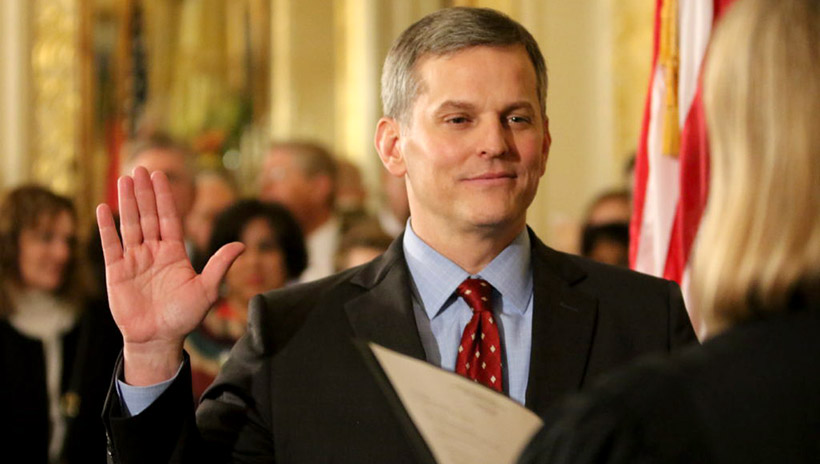Publisher's note: This post appears here courtesy of the Carolina Journal, and written by Kari Travis.
Attorney General Josh Stein, during a January 2017 swearing-in ceremony at the Executive Mansion. | Don Carrington/Carolina Journal
N.C. Attorney General
Josh Stein was always going to face backlash from Republicans over North Carolina's voter ID, regardless of how he handled the legal battle, some experts say.
The issue is just one play in a larger political ballgame.
On Jan. 2, Stein, a Democrat, announced he would appeal a Dec. 31 court order blocking the state's voter ID law. But there was a catch. To avoid voter confusion in the primary election, Stein said, the N.C. Department of Justice would wait until after March 3 to act.
The announcement kindled an indignant response from Republicans, who were urging Stein to immediately appeal.
Lt. Gov. Dan Forest, the presumed Republican gubernatorial candidate who will face off against Gov. Roy Cooper in the general election, launched a fiery statement condemning Stein's decision.
"It should be clear now to all North Carolinians that even though the people of this state voted overwhelmingly for photo voter ID, the Democrat Party - under the leadership of Governor Cooper, the tactics of Attorney General Stein, and the rulings of their activist liberal allies on the bench - has no intention of honoring the will of the people," Forest said.
"The only reason to oppose photo voter ID is if you intend to commit fraud at the ballot box."
Voter ID was a "no-win" situation for the attorney general, said Michael Bitzer, a professor of political science at Catawba College.
Democrats aren't happy with the AG's decision to defend the state's constitutional provision for voter ID, Bitzer added, but the action is a requirement for Stein, the chief legal representative for the state.
In November 2018, North Carolinians green-lighted the voter ID constitutional amendment. Shortly after, legislators filed Senate Bill 824, "Implementation of Voter ID Constitutional Amendment." The legislation was amended and examined intensively by House and Senate lawmakers before its December enactment. Only two Democrats, Sen. Ben Clark, D-Hoke, and Sen. Don Davis, D-Pitt, voted for the bill.
Cooper vetoed S.B. 824, but Republicans quickly overrode his decision. This time, no Democrats joined them.
GOP lawmakers and supporters have repeatedly said North Carolina's voter ID law is one of the most relaxed in the country. It provides voters multiple options for valid identification and offers photo cards for free. Still, the NAACP took S.B. 824 to court in the case
NAACP v. Cooper.
Judge Loretta Biggs, the Barack Obama appointee who issued the
order to block voter ID, said racial motivation factored into S.B. 824.
Now, Stein - as well as Forest - are engaged in political theater, said David McLennan, a political science professor from Meredith College. That's to be expected during an election year, he said.
Forest, who was first elected as the state's lieutenant governor in 2012, is running against Rep. Holly Grange, R-New Hanover, in the Republican primary for governor. The winner, which many expect to be Forest, will square off against Cooper later this year.
Voter ID will continue to be one of many talking points leveled by contenders this year, Bitzer said.
But it may be a fizzling factor, McLennan said.
"By the time the general election rolls around, this will be a largely forgotten issue as Forest, assuming he is the Republican nominee, will go after Governor Cooper on other issues," McLennan said.
"Likewise, the Republican nominee for attorney general will likely target Stein's other decisions on other lawsuits the state has been involved in ... against the pharmaceutical industry or the U.S. Department of Education."
Issues such as voter ID aren't as much policy questions as they are political fodder, Bitzer said. And polarized debates over such appeal mostly to party-line voters who've already decided what box they will check come election day.
"Everything is going to be seen through partisan lenses," Bitzer said,
"and everybody's playing the game to play to their home team."
























